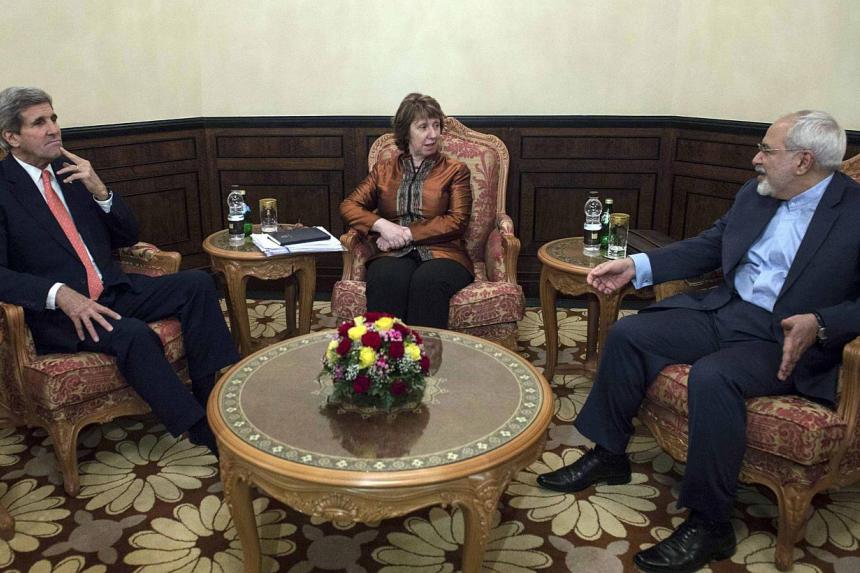MUSCAT, (AFP) - A hard-fought nuclear deal hung in the balance as Iran and the United States ended talks Monday in Oman, with signs the haggling will continue until a November 24 deadline.
Over the past two days US Secretary of State John Kerry and Iran's Foreign Minister Mohammad Javad Zarif sought to overcome deep differences, allay mutual suspicion and bring 12 months of diplomatic brinkmanship to the point of a breakthrough.
As each laid out their demands in private, warnings came that a final agreement may prove elusive, but in their only public comments in over 10 hours of talks neither man revealed what remains unsolved in the long-running bid for a comprehensive accord.
Asked if they were making progress, as they appeared briefly for photographers, Mr Zarif replied: "We will eventually." Mr Kerry said: "We are working hard. We are working hard".
US President Barack Obama said Sunday that a "big gap" remained on how the West can have "verifiable, lock-tight assurances" that Iran cannot obtain a nuclear weapon.
"We may not be able to get there," Mr Obama told CBS News.
After the talks ended on Monday, the US State Department said they have proved "tough, direct and serious" while adding "there is still time" for progress.
Iran's deputy foreign minister Abbas Araghchi said "no progress" had been made during the two days.
"We can no longer talk about progress in the negotiations, but we are optimistic that we can reach an accord" before November 24, he said, quoted by ISNA news agency.
The Iranian delegation is under pressure to deliver a quick and total lifting of US, UN and European sanctions under a final deal. Obama, however, said sanctions would only be "slowly reduced" if Tehran meets its obligations.
The key sticking point is thought to be the number and type of uranium-enriching centrifuges Iran should be allowed to keep spinning in exchange for sanctions relief and rigorous inspections of its nuclear sites.
- Deal already out of reach? -
Iran denies it is seeking a bomb and says its nuclear programme aims to produce atomic energy to reduce the country's reliance on fossil fuels, requiring a massive increase in its ability to enrich uranium in coming years.
The duration of a final settlement plan between Iran and the P5+1 group - Britain, China, France, Russia and the United States plus Germany - also remains contested, with Iran speaking of five years and world powers suggesting at least double that.
Some analysts have said a deal may already be out of reach.
"A full-fledged agreement is no longer possible before the deadline. What is still achievable is a breakthrough that could justify adding more time to the clock," Ali Vaez, senior Iran analyst at the International Crisis Group, told AFP.
"What is needed is a courageous political decision that neither side appears compelled to take until the 11th hour." The talks have already been extended once - when a July 20 deadline was missed. Despite the logjam, neither side has indicated it would walk away from the table.
The meetings in Muscat followed the revelation that Mr Obama reportedly wrote to Iran's supreme leader Ayatollah Ali Khamenei to push for a deal, arguing the Islamic republic and the West have shared regional interests.
This apparent reference to the fight against Islamic State group militants in Syria and Iraq was played down by Mr Kerry, however, with the US diplomat saying "there is no linkage whatsoever" with the nuclear talks.
Domestic politics are also a factor, given the loss in midterm elections of the Senate by Mr Obama's Democrats to the Republican party, members of which have consistently bridled at the White House's negotiations with Iran.
If talks go sour in the coming weeks it is thought the US Congress may respond with fresh sanctions on Iran.
Mr Obama has the power to veto them, but the prospect of new penalties could push already protracted dealmaking towards being untenable for the Iranian government.
Mr Zarif and President Hassan Rouhani are under fire from lawmakers sceptical of the interim deal, which came into force in January, who have also said a bigger, final agreement must be ratified by parliament.
As if to drive that message home on Sunday, 200 Iranian MPs signed a statement demanding that Mr Zarif's negotiating team "vigorously defend" the country's nuclear rights and ensure a "total lifting of sanctions".
But on Monday, Khamenei, who as Iran's supreme guide has the last word on all policy matters foreign and domestic, laid out nine points on Twitter from recent speeches as evidence of why he has supported the nuclear talks.

